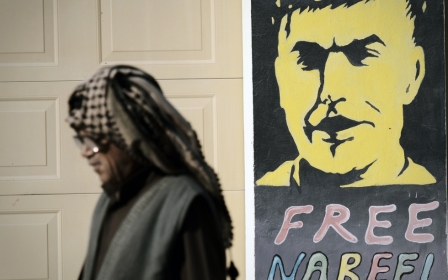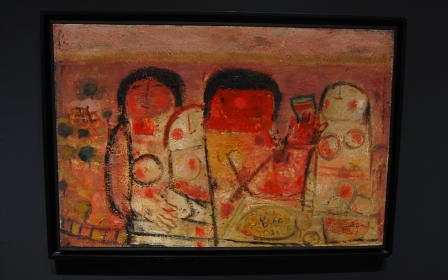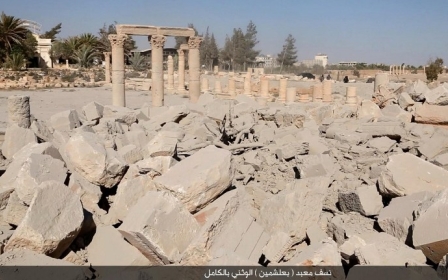Chinese artist Ai Weiwei plans to film documentary in war-torn Syria
NEW YORK, United States – Ai Weiwei is headed to Syria to shoot a documentary and spotlight the conflict that has devastated a nation’s “beautiful history” and blighted the lives of millions of its young, the dissident Chinese artist told Middle East Eye.
“Just talk about their children,” said Ai, who is known for his criticism of China’s human rights record.
“They already lost education for the past five years, and the whole generation will not be educated. And this happens in the 21st Century. It’s a continuous war there and there’s no way even to stop it.”
It is not the first time Ai has used his celebrity status to bring attention to Syrian suffering. In January, he recreated a photo of drowned toddler Alan Kurdi by lying face-down on a pebbled Greek beach as part of a series of projects on the refugee crisis.
Speaking with MEE at an event at the Council on Foreign Relations, a New York-based think-tank, Ai lamented Syria’s chaos, saying: “The nation has such a beautiful history, completely destroyed by many, many reasons. So many people trying to profit from it.”
After travelling to the US-Mexico border to monitor migration issues there, Ai will visit Syria “to get first-hand information”, he said. He did not discuss whether he would enter the country on a government-issued visa.
“I really want to face the danger and to be in the situation – I think that’s more real,” said Ai, 59.
“That’s why I want to get into Syria. As a documentary maker, you don’t have to be there, but you still try to be there because we’re not making a documentary to educate others but rather to educate myself.”
More than 300,000 people have been killed since Syria’s war devolved from a widespread protest movement against President Bashar al-Assad’s rule in March 2011 into a multi-front war between rebels, militants, Kurds and government forces and their allies.
It has increasingly become a global issue involving Turkey, Gulf states and others. Russia and Iran back Assad; the US and many European countries demand that he step down as they deploy warplanes to bomb the Islamic State (IS).
“Syria is so small and affects our global situation so dramatically,” Ai told MEE. “So how should we cope with the situation? I mean, [do] our political leaders, our visionaries, our thinkers really have the reality, or just pretend not to see it?”
Ai, who spent 81 days in detention in China without charge, has visited refugee camps for Syrians and others, including Idomeni on the Greek-Macedonian border, in recent months. He said he witnessed difficult conditions and wanted to share the experience.
Hollywood stars including Angelina Jolie and Orlando Bloom are among celebrities who have visited camps to underscore the ongoing crisis as people fleeing conflict and poverty in the Middle East and other regions have flooded into Europe since 2015.
Solidarity with Gulf dissidents
After the event, Ai posed for photos as part of an online campaign using the hashtag #KingdomOfArbitraryDetention, following the release of a report by Human Rights Watch about 140 dissidents in Gulf petro-monarchies who have fallen afoul of authorities in recent years.
A website unveiled recently by the rights group aims to raise awareness about the struggles of political activists in Bahrain, Kuwait, Oman, Qatar, Saudi Arabia and the United Arab Emirates, the group said.
Minky Worden, HRW’s director of global initiatives, said Ai has repeatedly highlighted online censorship through his art, including his installations on Alcatraz Island, and thanked him for deploying his “megaphone to help Saudi activists”.
“There’s a lot of overlap between the art he has done on internet censorship and his support for internet activists or dissidents and the work that we’re doing on this campaign,” Worden told MEE. “The Gulf is an especially repressive place for internet activists.”
In a report, HRW, a US-based rights watchdog, accused Gulf governments of responding to online criticism with “surveillance, arrests and other arbitrary punishments” in an attempt to silence critics.
A new website project features 140 political activists, in a nod to Twitter’s 140-character limit. In recent years, comments made on Twitter have gotten many Gulf citizens and residents in legal trouble, incurring charges such as insulting the authorities and blasphemy.
In a release, HRW cited Bahraini opposition figure Nabil Rajab, Saudi human rights activist Waleed Abu al-Khair and UAE reform advocate Ahmed Mansoor, among others, who have been jailed for “exercising their right to freedom of expression”.
Sarah Leah Whitson, HRW’s Middle East director, told MEE that the project is designed to “call out Saudi” Arabia for its transgressions.
“For years, we’ve documented the arbitrary detention of activists, lawyers, writers and journalists in Saudi Arabia and throughout the Gulf, who are prosecuted under harsh terrorism laws merely for expressing their political or religious opinion,” Whitson told MEE.
“It’s shameful that they use the guise of terrorism, which is about political violence, against non-violent, peaceful writers and activists.”
New MEE newsletter: Jerusalem Dispatch
Sign up to get the latest insights and analysis on Israel-Palestine, alongside Turkey Unpacked and other MEE newsletters
Middle East Eye delivers independent and unrivalled coverage and analysis of the Middle East, North Africa and beyond. To learn more about republishing this content and the associated fees, please fill out this form. More about MEE can be found here.




